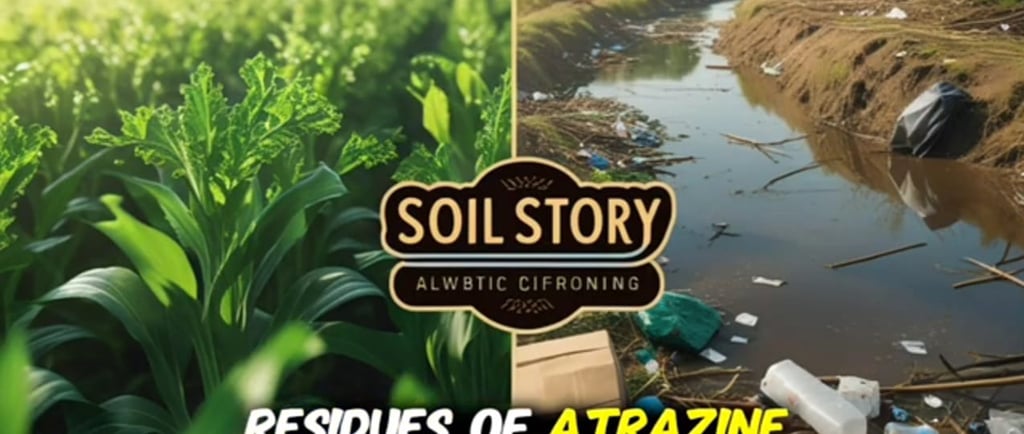spanopro-Tm by nanospan for competitive aac/alc
Smart G-Bio Pesticide
To address the need of effective and cost affordable - organics pesticide. Collaborate with DR. Ir. Sapto Supono, MSi, an agriculture expert, practitioner and observer. Our reseach team at AGIC develops an affordable and Smart G-Bio Pesticides product series of which is able to target specific pest and potential mitigate residual chemical pesticide on soil surface.
AGIC's Website Admin
8/31/20253 min read
Click the picture to watch related YouTube VClip. Credit to The Soil Story Chanel, for test purpose.
There is not really any global scarcity of pesticide, but rather a growing crisis of pesticide pollution and risk to agricultural land and water resources. With a rising global population and increased food demand, pesticide use is projected to grow, and nearly two-thirds of the world's agricultural land is already at risk from pollution especially in high-biodiversity and water scarce regions. This situation necessitates a shift to sustainable agriculture and integrated pest management (IPM) to reduce environmental harm. (Jian Chen et all., 2025).
Why does organics pesticides matter? Because they are key part of organic farming, which promotes environmental health by supporting bio-diversity, improving soil health, and reducing pollution. They also benefit human health by minimizing exposure to harmful synthetic chemicals, which can reduce risks of disease. By breaking down more quickly and often being more selective, organic pesticides are a more sustainable and nature-friendly approach to pest control compared to conventional chemical pesticides.
Advantages and dis-advantages of organic pesticides compared to chemical ones. Organic pesticides offer advantages like lower toxicity, environmental sustainability, and minimal food residues, protecting beneficial insects and soil health. However, they are often less persistent, requiring more frequent application for severe infestations and potentially becoming more expensive. Chemical pesticides, while more persistent and less expensive, pose greater health and environmental risks due to their toxicity, persistence in the environment, and higher residue concerns.
Can Graphene-based Pesticides be better option? Graphene-based pesticides show potential benefits over traditional methods by increasing the efficiency of chemical pesticides, allowing for reduced dosages and sustained release. However, while they can improve efficacy graphene-based pesticides are not inherently "better" than all other types of pesticides, especially when considering the significant potential hazards of graphene materials to human health and environment, and the inherent benefits of some organic pesticides. (E. Lampiri, et all., 2025).
Comparison with Organic vs. Chemical Pesticides. Organic Pesticides: Often take longer to work and require more labor and time for methods like hand-picking. Chemical Pesticides: Can have negative long-term health effects and contribute to environmental contamination. Graphene-based Pesticides: Offer improved efficacy and delivery for chemicals but introduce potential toxicity concerns that are not present with organic pesticides and need more research to fully understand.
What if it is synthesized based on biomass precursor only? Biomass - graphene nanoparticles (NPs) based pesticides, are not typically considered organic. While the graphene component might be derived from biomass, the process of creating nanoparticles and their subsequent use in agriculture involves synthetic modifications and technological interventions that move them outside the strict definition of organic. Benefits of functionalizing graphene nanoparticles (NPs) in fertilizer-pesticides: enhancing photosynthesis efficiency for foliar apps. While for soil apps.; EPN & Pesticides slow releaser, enhancing soil's electrochemical properties, promote the absorption of nutrients by root systems, increase fertilizers - pesticides application rates, reduce agricultural surface pollution, and enhance fertilizer-pesticides efficiency and conservations. (Wang, et all., 2023). Ultimately leading to improve productivity and sustainability of agricultural soils.
Challenges for graphene-based pesticides include the need for optimized synthesis and functionalization to improve efficacy, potential toxicity and environmental risks from release and aggregation, cost-effectiveness and affordability for widespread agriculture use achieving regulatory approval and consumer acceptance due to food safety concerns, and addressing issues with large-scale production and low yields.(Kamal Rana, et all., 2024).
What if, we can synthesize manufacturing a Graphene NPs composites-based Bio-Pesticides product series, using biomass and agriculture waste only, as well as, least industrial chemicals involvement? Addressing the above challenges of developing a market ready Graphene NPs composites-based Bio-Pesticides, collaborating with DR Ir. Sapto Supono, MSi., an agriculture expert, practitioner and observer, AGIC's product research team works on further developing cost affordable Smart G-Bio Pesticides product series based on biomass and agriculture waste only, by employing our sustainable, eco-friendly and most cost competitive, at scale, patented, proprietary technology.
AGIC's Website Admin.


